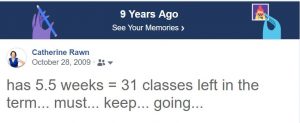In no particular order, some things I’ve learned this week at SPSP 2019 in Portland (See also #spsp2019)
* state mindfulness (ie as a result of a mindfulness task) can decrease motivation for goal pursuit (Hafenbrack & Vohs, 2018)
* a superordinate Aboriginal identity can incorporate and protect subgroup Aboriginal identities — and this work is happening right nearby me from SFU researchers (Neufeld & Schmitt, 2018)
* p values on a topic should skew toward the lower end if the effect is real (to the extent it’s large) rather than hovering close to .05. I knew this already, but I have a stronger understanding of why this is true (thanks to a talk by the amazing Simine Vazire at the Teaching Preconference)
* people around the world who encounter chairs inconveniently in their path differently move the chairs versus move themselves in predictable ways depending on within-culture and between-culture variables (Talhelm, Zhang, & Oishi, 2018)
* Goals that are set to include a range of successful end-states can be more motivating once people achieve the lower threshold. (The goal isn’t “done” then, but instead there’s a motivation boost to strive for the upper threshold.) (Wallace & Etkin)
* ongoing research is identifying differences in the way parents talk to older children about racism and racist incidents, ranging from awkwardness, shutting down, offering alternatives, to inviting conversation and helping the child form their own thoughts (Sylvia Perry’s work)
* The CREP (Collaborative Replications and Education Projects) exists and may provide an opportunity for our PSYC 217 Research Methods student projects to consider contributing to a systematic replication study https://osf.io/wfc6u/ (Jon Grahe)
* There is a science of collaborative science (start with Feist’s work) that we should be using to inform our upcoming(!) evaluation of/adjustments to UBC PSYC 217 Research Methods group projects
* women ask fewer questions than men at scientific conferences (Carter, Croft, Lukas, & Sandstrom, 2018), BUT “correlational data shows that when women ask the first q, the entire question-asking period is more gender-balanced” (check out Sandstrom for suggestions)
* there are problems with sexual harassment and low diversity at SPSP… and SPSP is working to improve both. http://spsp.org/about/climate-survey
From social interactions… things I knew but had reminders this week
* people who are professionally successful are still people — they (we) feel vulnerability, uncertainty, insecurity, shyness, fear, sadness, rejection, etc… as acutely as anyone else
* living with kids is kinda exhausting… but they’re also fascinating and heart-filling
* I enjoy participating in poster sessions (when I have a poster) more than I think I will.
* career paths are not straightforward and linear — a person can be pushed and/or pulled in a direction and it takes work to make shifts successfully
* knowing people at a conference helps me feel like I belong here, more willing to engage, ask questions, follow up, approach speakers. This also makes me think about how hard it might be for some folks to break in to the community… and what the diversity-related predictors are of those challenges.
* my friends, colleagues, and friend-colleagues are AMAZING scientists and teachers and humans and I’m grateful to get to hang out among them.

 Follow
Follow
